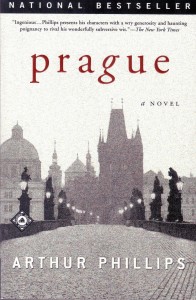Prague by Arthur Phillips (2003. Random House. ISBN 0-375-7577-8)
Too harsh, you say? I don’t think so, kind readers. The book blurb from The New York Times (the determinator (to coin a new Bushism) of good taste for American fiction readers) reads:
Ingenious…Phillips presents his characters with a wry generosity and haunting poignancy to rival his wonderfully subversive wit…”
Well, after slogging through 367 pages of Phillips’s prose, I am a bit confused: I never found much evidence of “haunting poignancy” in this novel. Oh, there were fits and starts of a story (several stories in fact) in the form of some intriguing character sketches. One actress in this aborted play set in early 1990 Budapest, Nicky the bi-sexual, cropped hair, photographer and painter, is particularly well crafted and comes off as a complete, if flawed, human being. The primary protagonist, John (a journalist working at a tabloid in the Hungarian capital) is less fully developed, though Phillips does spend a great amount of paper and ink creating a tale of ugly sibling rivalry between John and his brother Scott, a conflict that finally disipates into thin air like smog from Budapestian traffic. That’s the pattern that is repeated time and time again throughout this novel: Characters are introduced through great chunks of narrative and dialogue that seemingly ramble on for pages, only to have those actors vaporize without any resolution of their respective roles in the overall plot.
Now it may be that I am too dunderheaded to appreciate challenging, new-era prose for the genius that it is. I am a fairly straight forward sort of a guy who responds best to novels told in classic fashion. So take this criticism with a grain of salt if you relish the odd, the brinksmanship of say, Ulysses. I’m just not that interested in stories that don’t take me to a conclusion where sense is made; where the inner and outer turmoil of fictional characters comes to a point of resolution. That’s my main criticism of this book: The writing is, overall, nicely done (with the exception of the dialogue, which tends to denigrate into speechifying) but the story is so disjointed and unrelentingly inconsequential, I found myself wanting more and getting less. For example, about half-way through the tale, Phillips introduces us to Imre Horvath, an old man and the last of a publishing dynasty that has printed Hungarian literature for over a century. Much of the second section of the book deals with Horvath’s attempts to obtain the rights to the Hungarian portion of his family’s former empire as the Communists leave power and free enterprise returns to Budapest. Charles, another main character (part of the cadre of expatriates integral to the overall story as they move through the city and plot as a group, as a band of merrymakers) ends up working with Horvath in the old man’s efforts to reunite the company. Phillips gives us, through Horvath’s piece of the overarching “pie” that sometimes resembles a plot and sometimes resembles a series of vignettes, a reason to become intrigued. But the effort doesn’t satisfy because, just as soon as we are captured by the old man’s story, we’re off again chasing the cherished Emily (the somewhat infantile and unfeeling object of John’s romantic love); or watching Mark, a gay Canadian of means implode; or sitting in the corner of John’s bedroom voyeuristically watching as he deflowers a Hungarian speed skater.
I’ll admit to it: I was looking for another Per Petterson novel after reading Out Stealing Horses and stumbled upon this book in the “P'” section at our local Barnes and Noble. I’d never heard of Arthur Phillips or the book but given I have a desire to someday go to Prague and act like a typical boorish American tourist, and given that the cover is extremely captivating, I picked up a copy (along with Petterson’s To Siberia which was a far better read. You can find a review of To Siberia and Out Stealing Horses below). To my mind, Prague doesn’t live up to its cover blurbs or its cover.
One final note. The title of this review comes from the fact that the story is set in Budapest, not Prague. The inside joke amongst the characters, if you will, is that they all long to live in Prague, which, during the early 1990s, was seen as the cultural equal to 1920s Paris by American men and women of creative bent. I wanted Prague and got Budapest. That, in and of itself, isn’t all bad and I’ll give Phillips an “A” for clever deception. But I really did want to be find myself immersed in a story set in Prague, with characters and a plot that made me desire to visit there immediately. I felt no such visceral longing for Budapest as a result of reading this book. I won’t say that my time spent in Hungary was completely wasted but I will say the tour guide could have been more succinct and direct in the construction of his truth.
3 and 1/2 stars out of 4.



